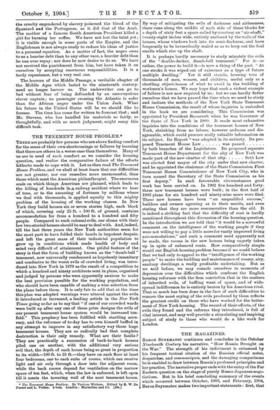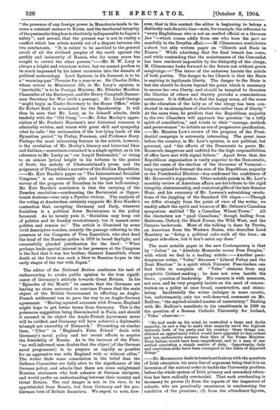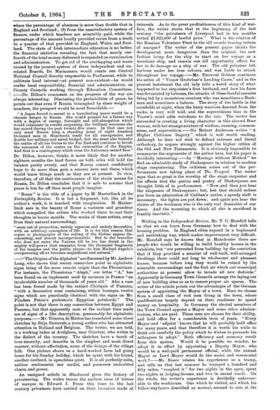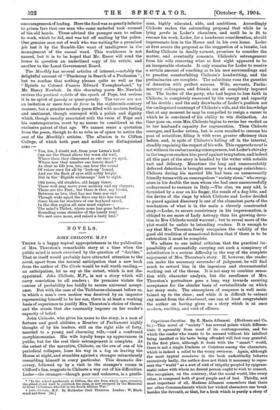BA.BON SIIYEMATSIT continues and concludes in the October Nineteenth Century
his narrative, "How Russia Brought on the War." The strength of his indictment is enhanced by his frequent textual citation of the Russian official notes, despatches, and convmuniqua, and the damaging comparisons he is enabled to draw between Russia's professed principles and her practice. The narrative proper ends with the entry of the Far Eastern question on the stage of purely Russo-Japanese nego- tiations. But in his brief concluding summary of the events which occurred between October, 1903, and February, 1904, Baron Suyemateu makes two important statements : first, that
"the presence of any foreign power in Manchuria tends to be- come a constant menace to Korea, and the territorial integrity of the peninsular kingdom is absolutely indispensable to Japan's safety "; and second, that the present war is not in reality a conflict which has arisen merely out of a dispute between the two combatants. "It is rather to be ascribed to the general revolt of all the civilised peoples of the earth against the perfidy and insincerity of Russia, who for many years has sought to outwit the other powers."—Mr. H. W. Lucy is always a bright and vivacious writer, but we cannot profess to be much impressed by his latest excursion into the domain of political meteorology. Lord Spencer, in his forecast, is to be a" warming-pan" Premier for a year or so. Sir Charles Dilke, whose return to Ministerial life, in Mr. Lucy's opinion, is "inevitable," is to be Foreign Minister, Mr. Fletcher Moulton Chancellor of the Exchequer, and Sir Henry Campbell-Banner- man Secretary for War (with a peerage). Mr. Lloyd-George "might begin as Under-Secretary to the Home Office," while Sir Robert Reid is nominated for the Speakership. It will thus be seen that Mr. Lucy, as be himself admits, deals tenderly with the Old Gang."—Mr. John Morley's appre- ciation of Mr. Frederic Harrison's new historical romance is admirably written, and traces with great skill and sympathy what he calls "the reclamation of the low-lying lands of the Byzantine period" by Finlay, Freeman, and Professor Bury. Perhaps the most interesting feature in the article, however, is the revelation of Mr. Morley's literary and historical likes and dislikes,—sometimes contained in a single epithet, as in his reference to Mr. Lecky as "our limpid Rationalist," or rising to an almost lyrical height in his tributes to the genius of Scott, the melody of Chateaubriand's prose, and the poignancy of Thucydides's narrative of the Sicilian Expedition. —Mr. Keir Hardie's paper on "The International Socialist Congress" is an extremely able and temperately written survey of the progress of Socialism in the last half-century. Mr. Keir Hardie's conclusion is that the carrying of the Dresden resolution—condemning the Revisionist or Oppor- tunist doctrine—was only a Pyrrhic victory. The analysis of the voting at Amsterdam certainly supports Mr. Keir Hardie's contention that, excepting Germany and Italy, wherever Socialism is a political force Revisionism is the policy favoured. As he tersely puts it, "Socialism may keep out of politics and be frankly revolutionary, but it cannot enter politics and remain so." The article is illumined by some vivid descriptive touches, notably the passage referring to the presence at the Congress of Vera Zassulitch, who shot dead the head of the Russian police in 1878 in broad daylight, and successfully pleaded justification for the deed : "What perhaps lends special interest to her presence at the Congress is the fact that it was her brother, General Zassulitch, whose death at the front was such a blow to Russian hopes in the early stages of the war with Japan."
The editor of the National Review continues his task of endeavouring to awake public opinion to the true signifi- cance of Germany's attitude towards Great Britain. In his "Episodes of the Month" he asserts that the Germans are leaving no stone unturned to convince France that the main object of the British Government in effecting an Anglo- French settlement was to pave the way to an Anglo-German agreement. "Having squared accounts with France, England might hope to get better terms from Germany. This is the poisonous suggestion being disseminated in Paris, and should it succeed in its object the Anglo-French Agreement never will be ratified, and Germany will have achieved a diplomatic triumph not unworthy of Bismarck." Proceeding on similar lines, " Ultor " in "England's False Friend" deals with Germany's naval policy and her recent efforts to acquire the friendship of Russia. As to the increase of the Fleet, "no well-informed man doubts that the object [of the German naval programme] is to prepare as rapidly as possible for an aggressive war with England with or without allies." The writer finds some consolation in the belief that the Defence Committee are fully alive to the significance of the German policy, and admits that there are some enlightened Russian statesmen who look askance at German intrigues, and would prefer an understanding between their country and Great Britain. The real danger is not, in his view, to be apprehended from Russia, but from Germany and the pro- German bent of British financiers. We regret to note, how- ever, that in this context the editor is beginning to betray a, distinctly anti-Semitic bias—note, for example, the reference bra "every Englishman who is not an ossified official or a German Jew "—which comes oddly from one who bore his part so. manfully in the Dreyfus affair.—M. Clemenceau contributes, a short but ably written paper on "Church and State in France." While admitting that the final breach has come,. and while contending that the maintenance of the Concordat has been rendered impossible by the disloyalty of the clergy,. M. Clemenceau looks forward to the future not without grave misgivings :—" The terror of the unknown haunts the minds of both parties. The danger to the Church is that the State.
is aspiring to legitimate liberty. The danger to the State is lest she should be drawn beyond the point which is necessary to secure her own liberty, and should be tempted to threaten the liberties of others and thereby provoke a conscientious. resistance. It is difficult to find the happy mean, all the more as the education of the laity as of the clergy has been con- ducted in an atmosphere of absolutism rather than of liberty."
At the same time, he predicts that the Republican majority in the two Chambers will approach the question "in a lofty spirit of conciliation," and trusts to their "courage, method, and perseverance" to initiate an era of progressive pacification. —Mr. Maurice Low's review of the progress of the Presi- dential campaign is extremely interesting. The great issue before the country, in Mr. Low's opinion, is not political, but personal, and "the efforts of the Democrats to prove Mr. Roosevelt dangerous and unfitted for the high responsibilities of office have met with signal failure." Apart from that, the Republican organisation is vastly superior to the Democratic, and the omen of the election of the Governor of Vermont— long recognised to forecast the size of the Republican majority at the Presidential Election—has confirmed the confidence of Mr. Roosevelt's supporters. Other notable points in Mr. Low's, monthly review of American affairs are his tribute to the rigid integrity, statesmanship, and oratorical gifts of the late Senator Hoar, and his summary of Mr. Lawson's astonishing revela- tions of the juggling of the Standard Oil clique.—Though we differ strongly from the point of view of the writer, we readily admit the spirit and humour of Mr. Osborn's Canadian symposium entitled "By a Canadian Wheat-Tower." All the characters are "good Canadians," though hailing from Battersea, Oxford, the Black Forest, the Wild West, and the Ontario backwoods. Most of the talking is done by Perrin', an American from the Western States, who describes Lord. Rosebery as "doing a political cake-walk all the time ; an elegant side-show, but it don't catch my dime."
The most notable paper in the new Contemporary is that by " Julius " on "Absolute Monarchs versus Free Peoples," with which we deal in a leading article.—Another wen,- donymous writer, " Veles," discusses "Liberal Policy and the Next Election" in a spirit which Unionist Free-traders can find little to complain of. " Veles " abstains from any prophetic Cabinet-making ; he does not even handle the thorn. question of leadership. His concern is with measures, not men, and he very properly insists on the need of concen- tration on a policy at once broad, constructive, and stimu- lating. Incidentally the writer indulges in some caustic, but, unfortunately, only too well-deserved, comment on Mr.
Balfour," the myriad-minded master of uncertainty." Dealing with Mr. Balfour's manifesto to his constituents in 1899 on. the question of a Roman Catholic University for Ireland,.
,` Veles " observes :—
"He had made up his mind, he controlled a large and docile majority, he saw a way to make that majority serve the highest interests both of his party and his country : these things cone stituted an opportunity which would have appealed to less ardent and less enthusiastic natures than that of the Prime Minister. Even failure would have been magnificent, and to a man of one settled conviction a simple matter of duty. Opportunity, duty and conviction alike have been consigned to the limbo of departed things."
—Dr. Macnam ara deals in trench ant fashion with the question. of Irish education, his main line of argument being that it is an inversion of the natural order to tackle the University problem before the whole system of Irish primary and secondary educa- tion has been radically overhauled. That such overhauling is.
necessary he proves (1) from the reports of the inspectors of schools, who are practically unanimous in condemning the condition of the premises ; (2) from the attendance figures,. where the percentage of absences is more than double that in England and Scotland ; (3) from the unsatisfactory system of finance, under which teachers are miserably paid, while the percentage of the amount locally provided varies from a tenth to a quarter of that provided in England, Wales, and Scot- land. The state of Irish intermediate education is no better, the financial statistics revealing the fact that nearly one- fourth of the total money disbursed is expended on examination and administration. To get rid of the overlapping and waste caused by the present system of three independent and un- related Boards, Dr. Macnamara would create one Central National Council directly responsible to Parliament, while to cultivate local interest—at present non-existent--he would confer local responsibility, financial and administrative, on County Councils working through Education Committees. / —Dr. Dillon's comments on the progress of the war are always interesting. Discussing the probabilities of peace, he points out that even if Russia triumphed by sheer weight of numbers, the prospect would be most formidable :-
A Japan forced to assent to a humiliating peace would be a chronic danger to Russia. She would prepare for a future war with a degree of energy, foresight and self-abnegation which would culminate in results surpassing the brilliant successes she has scored during the past twenty-five years. In that case not only must Russia keep a standing army of eight hundred thousand men in Manchuria ready for all emergencies, and double her military and naval budget, but she must also transfer the centre of all her forces to the Far East and continue to lavish the resources of the centre on the extremities of the Empire. And that is a contingency which even the Autocracy cannot face."
Dr. Dillon, however, thinks it more likely that for another eighteen months the land forces on both sides will hold the balance pretty evenly, and that Russia cannot confidently hope to do more than gain a success here and there, which
would leave things much as they are at present. In view, therefore, of all that the continuance of the strain means for Russia, Dr. Dillon concludes that it is safe to assume that peace is less far off than most people imagine.
"Rome "' is the title of a" paper paper by M. Maeterlinck in the Fortnightly Review. It is but a fragment, but, like all its author's work, it is touched with imagination. M. Maeter-
linck sees in the beauty of Rome a vastness and grandeur which compelled the artists who worked there to cast their thoughts in heroic moulds. The works of these artists, away from their natural surroundings,
"seem out of proportion, unduly vigorous and unduly decorative, with an arbitrary conception of life. It is for this reason that copies or photographs of the ceiling of the Sistine appear dis- concerting, and almost incomprehensible. But to the traveller who does not enter the Vatican till he too has drunk in the mighty will-power that emanates from the thousand fragments of the temples and the public places—to him Michael Angelo's overpowering effort becomes magnificent and natural."
—"The Origins of the Alphabet "are discussed by Mr. Andrew Lang, who shows that recent researches point to alphabetic
signs being of far more remote origin than the Phoenicians. For instance, the Phoenician " Aleph," our letter "A," has been found on an implement used by cavemen in France "an incalculable number of thousands of years old." Also a vase has been found made by the extinct Chiriquis of Panama, "with a decorative zone containing, within lozenges, twelve signs which are practically identical with the signs on Mr. Flinders Petrie's prehistoric Egyptian potsherds." The point is not that there is any connection between Egypt and Panama, but that apparently man at the earliest time made use of signs of a like description, presumably for alphabetic purposes.—Mr. Teixeira de Mattes has translated some three sketches by Stijn Streuvels,a young author who has attracted attention in Holland and Belgium. The writer, we are told, is a working baker at Avelghem, near Courtrai, who writes in the dialect of the country. The sketches have a touch of true sincerity, and describe in the simplest and most direct manner, without affectation, some of the doings of the village
folk. One picture shows us a hard-worked farm lad going home for his Sunday holiday, which he spent with his friend, another cowherd, in speechless quiet. It is all perfectly calm, neither sentimental nor sordid, and possesses undoubted charm and power.
An unsigned article in Blackwood gives the history of
privateering. The writer traces the earliest issue of letters of marque to Edward I. From this time to the last century privateers have carried on their lucrative trade at
intervals. As to the great profitableness of this kind of war- fare, the writer states that at the beginning of the last century "the privateers of Liverpool had in ten months netted £1,025,600 of lawful prize." What is the relation of the Russian Volunteer Fleet to the old vessels bearing letters of marque ? The writer of the present paper thinks the development more dangerous than the original, the new fashion being for the ship to start on her voyage as a. merchant ship, and remain one till opportunity offers for her to do damage as a ship of war. The old privateer left. harbour under her true colours, and was liable to attack throughout her voyage.—Mr. Perceval Gibbon continues his series of " Vrouw Grobelaar's Leading Cases," and in the present instalment the old lady tells a weird story of what happened to her step-sister's first husband, and how his farm was devastated by baboons, the attacks of these fearful enemies being led by a monstrous creature who was sometimes a Bush- man and sometimes a baboon. The story of the battle in the- cornfields at night, when the hairy warriors descend from the rocks, is very well told, and the superstitious bias in the Vrouw's mind adds weirdness to the tale. The writer has- succeeded in creating a living character in this shrewd Boer woman, with her strange mixture of wisdom, cunning, common- sense, and superstition.—Sir Robert Anderson writes "A Higher Criticism Inquiry" which is well worth reading. Although he does not wish to defend extreme and literal orthodoxy, he argues strongly against the higher critics of the Old and New Testaments. It is obviously impossible to summarise the arguments of the author here, but his paper is decidedly interesting.—In "Musings without Method" we find an admirable study of Shakespeare in relation to modern stage carpentering. The criticism arises out of the per- formances now taking place of The Tempest. The writer says that so great is the worship of the stage carpenter and his effects that the genius and poetry of Shakespeare are thought little of in performance. "Now and then you hear- the eloquence of Shakespeare ; but, lest that should seduce you from an admiration of Caliban's antics, a speedy shift is necessary; the lights are put down ; and again you hear the clatter of the workman who is the only real dramatist of our times. And the mounting to which all else is sacrificed is frankly inartistic."
Writing in the Independent Review, Mr. T. C. Horsfall tells. us that we can learn from Germany how to deal with the housing problem. In England cities expand in a haphazard and unthinking way, which makes improvement very difficult. Mr. Horsf all says he knows that in Manchester there are people who would be willing to build healthy houses in the outskirts, but "are prevented from building by the conviction that if they provided a number of well-built, well-arranged dwellings these could not long be wholesome and pleasant homes, because before long they would be ruined by the miserable surroundings and the foul air which our municipal. authorities at present allow to invade all new districts." Apparently in Germany Town Councils arrange the laying out of new building sites so as to ensure proper air spaces. The writer of the article points out the advantages of the German system of appointing the Mayor of a town. Here we choose from a small class of rich men living in the town, whose qualifications largely depend on their readiness to spend money on hospitality. In Germany the elected members of the Town Council appoint a Mayor and some other adminis- trators, who are paid. These men are chosen for their ability, and hold office for a considerable term of years. "Every Mayor and ' adjoint ' knows that he will probably hold office for many years, and that therefore it is worth his while to think out carefully the policy which he wishes to persuade his- colleagues to adopt." Both efficiency and economy result from this system. Would it be possible, we wonder, to. adopt it in effect by appointing a Deputy Mayor, who, would be a well-paid permanent official, while the annual Mayor or Lord Mayor would do the social and ceremonial work P—Mr. Ensor relates his experiences as a tramp, and tells us that last summer be tramped a hundred and fifty miles, "roughed it" for two nights in the open, spent two nights in lodging-houses, and two in casual wards. On the whole, the writer's experience is decidedly unfavour- able to the workhouse. One which he visited, and which his fellow-wayfarers described as normal, seemed to aim at the
to prison fare that one man who came underfed took counsel -of the old hands. These advised the younger man to refuse to work, which he did, and was led off smiling by the police.
One genuine man out of work who was waiting for a promised job lost it by the Bumble-like want of intelligence in the management of the casual ward. This workhouse is not named, but it is to be hoped that Mr. Ensor will send the house in question an underlined copy of his article, and another to the Local Government Board.
The Monthly has several articles of interest,—notably the -delightful account of " Thackeray in Search of a Profession" ; but we confess that nothing pleases quite so well as the -" Epistle to Colonel Francis Edward Younghusband," by Mr. Henry Newbolt. In this charming poem Mr. Newbolt revives the poetical epistle of the epoch of Pope, but revives it in no spirit of parody or quasi-parody. The verses are not an imitation or mere tour de force in the eighteenth-century
manner, but a genuine modern poem filled with modern feeling and sentiment, though conveyed with a polish and dignity which, though usually associated with the verse of Pope and his contemporaries, must by no means be considered as the 'exclusive patent of that age. We cannot resist a quotation from the poem, though to do so robs us of space to notice the
rest of the Monthly's articles. The allusion is to Clifton College, of which both poet and soldier are distinguished
sons :— "You, too, I doubt not, from your Lama's hall Can see the Stand above the worn old wall, Where then they clamoured as our race we sped, Where now they number our heroic dead.* As clear as life you, too, can hear the sound Of voices once for all by 'lock-up' bound, And see the flash of eyes still nobly bright But in the Bigside scrimmage' lost to sight.
Old loves, old rivalries, old happy times, These well may move your memory and my rhymes; These are the Past; but there is that, my friend, Between us two, that has nor time nor end. Though wide apart the lines our fate has traced Since those far shadows of our boyhood raced, In the dim region all men must explore— The mind's Thibet, where none has gone before— Rounding some shoulder of the lonely trail We met once more, and raised a lusty hail."













































 Previous page
Previous page